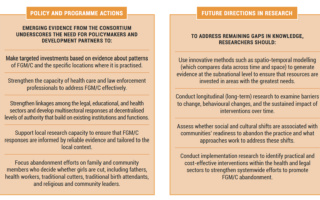
Female Genital Mutilation (FGM) is internationally recognized as a violation of human rights rooted in harmful gender and social norms. Since 2008, international efforts to accelerate the abandonment of FGM have expanded, including research, community-level work to address social norms and attitudes, revised legal frameworks criminalizing the practice, and growing political advocacy and support.
Despite increased attention and action, as well as resolutions passed by international monitoring bodies that condemn the practice, the effectiveness and impact of these efforts on the accelerated abandonment of the practice have been difficult to demonstrate and measure.
Efforts to ensure that FGM abandonment programs are informed by evidence face significant hurdles, including:
- Lack of evidence on what works to drive change
- Limited analyses of existing data on FGM to document change
- Lack of valid tools and innovative methods that can be used to measure progress toward behavior or social norms change within and across different contexts
In partnership with Population Council-Kenya, the Population Council is implementing the FGM Data Hub—the data and measurement arm of the United Kingdom’s Foreign, Commonwealth & Development Office (FCDO) flagship program, “Support to the Africa-Led Movement (ALM) to End Female Genital Mutilation.”
The role of the FGM Data Hub is to provide robust data, timely analyses, practical monitoring tools, and responsive technical assistance to inform the ALM’s program.
Working closely with the larger technical support arm of FCDO’s flagship program, the Data Hub will ultimately provide the ALM and the global community with evidence to inform the design, implementation, adaptation, and scaling of effective strategies to end FGM. Through a coordinated series of activities, the FGM Data Hub will deliver:
- New data analyses to inform efforts to end FGM
- Improved and robust tools and approaches for measuring incidence and prevalence of FGM as well as changes in norms and attitudes relating to FGM
- Guidance on good practice to enable the design and monitoring of FGM programs
- Stronger collaborations to enable development and use of durable and innovative measures
- Enhanced capacity of ALM suppliers, UNICEF/UNFPA, WHO, and other stakeholders to use improved measurements

